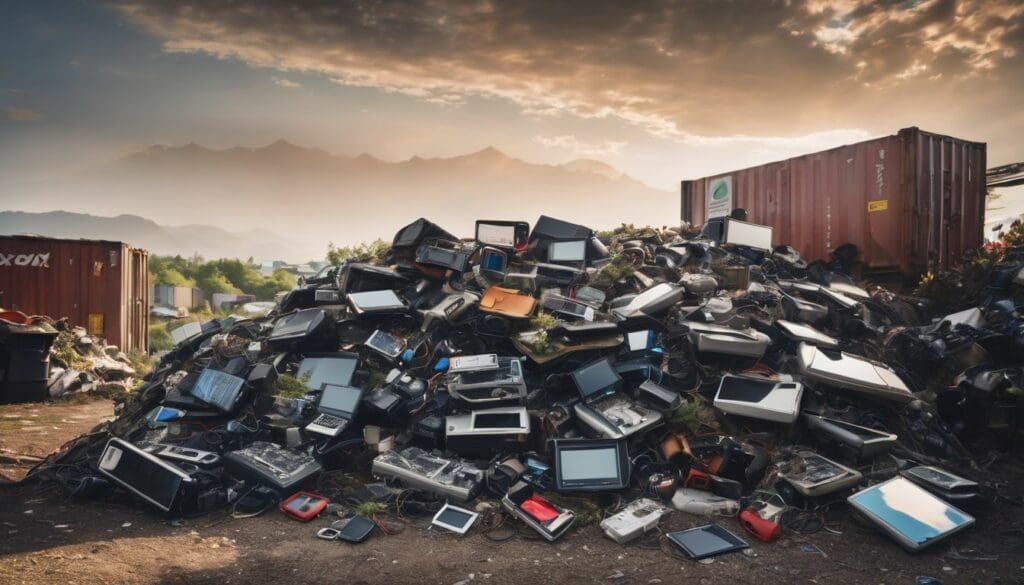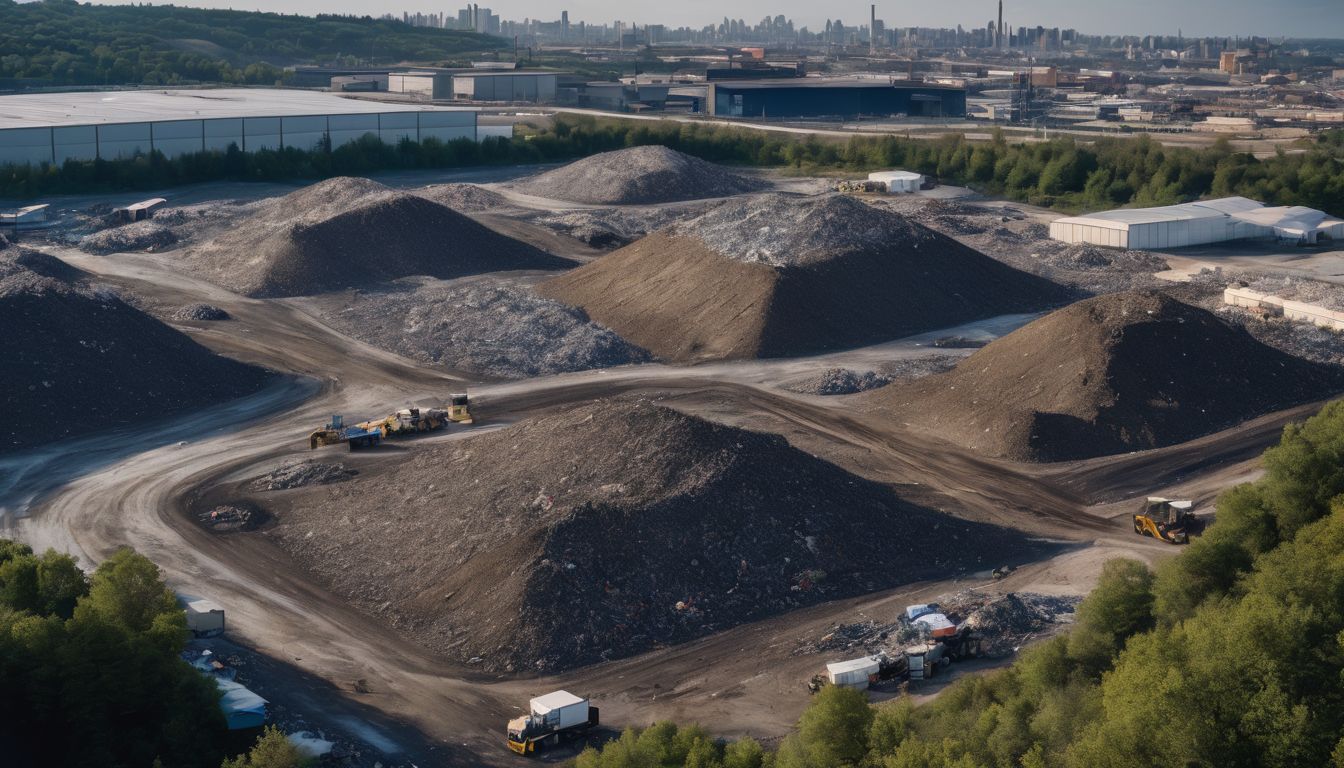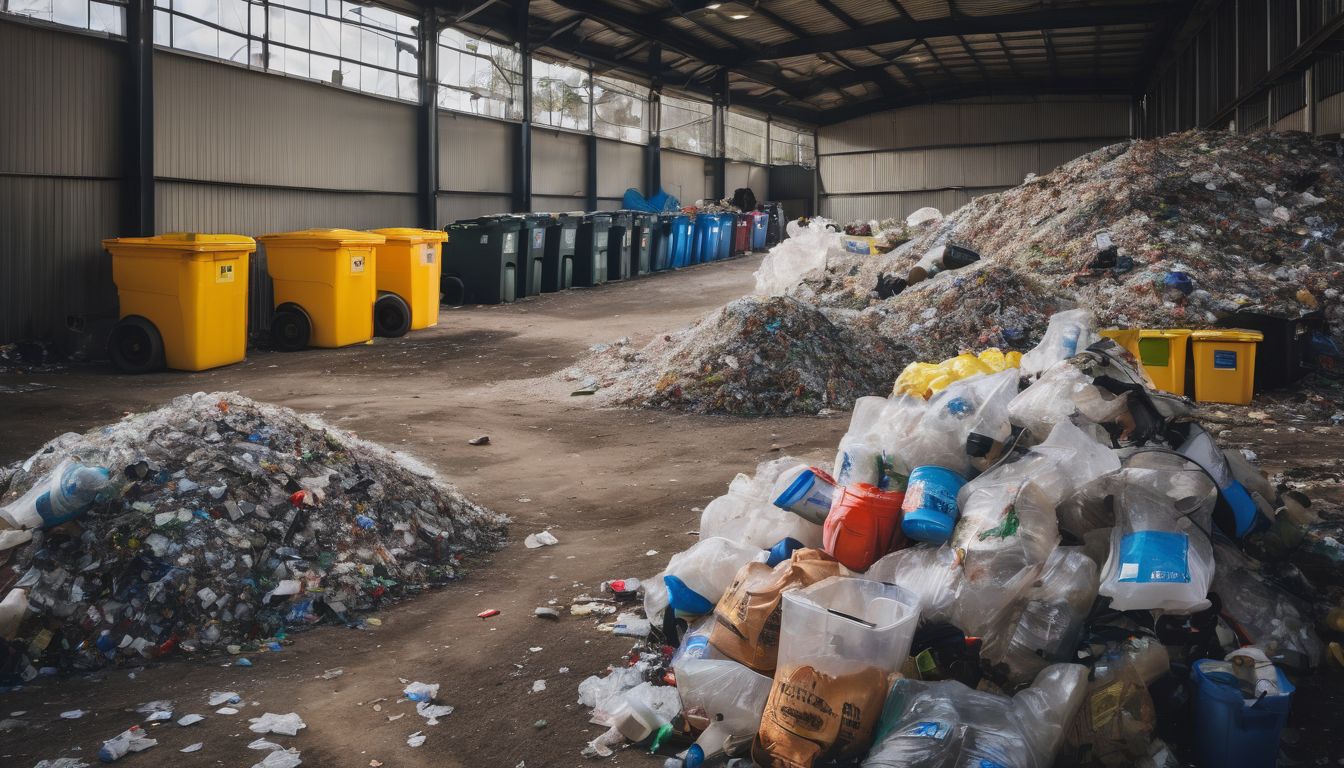Every day, our planet grapples with the growing mountain of electronic waste. Astonishingly, up to 50 million tonnes of e-waste are generated worldwide each year. This article will explore how recycling these gadgets can not only declutter your drawers but also rejuvenate our environment.
Let’s make a difference together!
Key Takeaways
- Recycling e – waste conserves valuable landfill space and prevents harmful substances from contaminating the soil and waterways, thus protecting ecosystems.
- It reduces the need to extract new natural resources, saving energy and preventing environmental destruction caused by mining activities.
- E – waste recycling creates job opportunities in the green technology and recycling industries, stimulating economic growth while promoting environmental sustainability.
- Responsible disposal of e – waste ensures secure data management, reducing risks of identity theft and maintaining privacy.
- By choosing certified recycling partners for electronic waste management, individuals can contribute to more effective resource conservation and pollution reduction.
The Importance of Recycling E-Waste
Recycling e-waste is important as it saves landfill space, natural resources, and creates more employment opportunities. Additionally, it protects the environment by removing and disposing of data properly.
Saves landfill space
E-waste takes up a significant amount of space in our already overflowing landfills. By recycling old electronics, we dramatically reduce the volume of waste that ends up in these dumping grounds.
Think about the smartphones, laptops, and TVs that get tossed out every year. If we recycle them instead of discarding them, we conserve precious landfill space.
Every gadget recycled is one less item contributing to the growing problem of landfill real estate; it’s an easy way for individuals to make a positive impact on land conservation and environmental health.
As we move forward towards conserving natural resources, let’s also consider how e-waste recycling leads to savings in energy consumption.
Saves natural resources
Recycling e-waste saves natural resources by reducing the need for raw materials like metal, plastic, and glass. This helps to conserve energy and water used in mining and manufacturing new products.
Additionally, it minimises the environmental impact of extracting and processing these resources, thus promoting a sustainable circular economy while protecting ecosystems from further exploitation.
Furthermore, recycling electronic waste prevents toxic substances such as lead, mercury, and cadmium from leaching into the soil and waterways. By keeping hazardous materials out of landfills, it safeguards human health while supporting environmentally friendly practices in resource recovery.
Creates more employment opportunities
Recycling e-waste creates more job opportunities, supporting the growth of a sustainable and eco-friendly economy. By expanding the recycling industry, there is an increased demand for workers to handle collection, sorting, processing, and innovative technologies relating to electronic waste management.
As the need for skilled and dedicated individuals in this sector grows, it offers substantial employment prospects whilst contributing to environmental conservation efforts.
Furthermore, the development of new e-waste recycling facilities not only boosts local economies but also provides diverse career options within green technology industries. This expansion supports corporate social responsibility initiatives while promoting a cleaner environment through efficient waste reduction practices.
Increases affordability
Recycling e-waste increases affordability by providing a sustainable source of valuable materials that can be used in the production of new electronic devices. This reduces the need for expensive extraction and processing of raw materials, ultimately lowering the overall cost of manufacturing electronics.
By making recycled components more readily available to manufacturers, the expense associated with producing new electronic goods is reduced, contributing to affordable prices for consumers.
Additionally, it creates opportunities for job creation and economic growth within the recycling industry, further supporting local communities while also promoting a circular economy.
Protects the environment
Recycling e-waste protects the environment by reducing the need for mining virgin resources. This helps conserve natural resources and prevents further destruction of ecosystems, aligning with sustainable recycling practices.
Additionally, it prevents toxic substances from seeping into water bodies, which in turn protects aquatic life and promotes a healthier environment.
Furthermore, recycling e-waste reduces air pollution caused by the improper disposal of electronic devices. By preventing toxic fumes from being released into the atmosphere, hazardous substances are kept out of the air we breathe, contributing to pollution prevention efforts.
Removes and disposes of data properly
E-waste recycling removes and disposes of data properly, ensuring that sensitive information does not end up in the wrong hands. Proper disposal protects privacy and prevents identity theft, addressing concerns of environmentally conscious individuals.
By choosing certified partners for e-waste recycling, support for conservation and environmental protection is ensured.
Moving forward to “How Recycling E-Waste Helps the Environment”, we can discuss the broader impact of e-waste recycling on ecosystems and resources conservation.
How Recycling E-Waste Helps the Environment
Recycling e-waste helps the environment by reducing the need for mining of virgin resources and providing environmentally friendly materials for manufacturers. It also prevents landfills from filling up with toxic waste, protecting water bodies and ecosystems.
Reduces mining of virgin resources
Recycling e-waste reduces the need for mining new natural resources like metals and minerals. This helps to conserve the earth’s finite resources while also reducing the environmental impact of extracting raw materials.
By reusing existing materials from discarded electronics, we can minimise the destruction of natural habitats caused by resource extraction and contribute to a more sustainable future for our planet.
Furthermore, recycling electronic waste lessens the demand for new components made from virgin resources, thereby decreasing energy consumption and pollution associated with mining, refining, and processing these materials.
Provides environmentally friendly resources for manufacturers
Manufacturers benefit from e-waste recycling by gaining access to eco-friendly resources. This aligns with the growing demand for sustainable production methods and materials. Reusing components from recycled electronics reduces the need for mining and processing virgin resources, contributing directly to conservation efforts.
The environmentally conscious manufacturing process also supports a circular economy, reducing waste and reliance on new raw materials. By choosing recycled electronic components, manufacturers actively participate in ecosystem protection and energy conservation, helping to build a more sustainable future.
Prevents landfills from filling up
Providing environmentally friendly resources for manufacturers, recycling e-waste prevents landfills from filling up. E-waste takes up a significant amount of space in landfills and contains harmful substances that can leach into the soil and water, posing serious environmental risks.
By diverting e-waste from landfills through recycling, we can reduce the strain on these already overwhelmed waste disposal sites, preserving valuable space for non-recyclable items and helping to protect our environment.
Recycling e-waste not only prevents landfills from filling up but also contributes to a sustainable approach to waste management by reducing the impact on our planet’s ecosystems.
Protects water bodies from toxic waste
Recycling e-waste protects water bodies from toxic waste by preventing hazardous substances from leaching into the groundwater. This helps to safeguard the purity of our rivers, lakes, and oceans, preserving aquatic ecosystems and ensuring a safe water supply for communities.
By responsibly disposing of electronic devices through recycling, harmful chemicals like lead, mercury, and cadmium are kept out of our waterways.
Furthermore, recycling e-waste reduces the risk of contaminating drinking water sources with dangerous substances that can pose serious health risks to both humans and wildlife. This vital action supports the conservation of natural resources while promoting eco-friendly practices in line with environmental sustainability efforts.
Saves land and energy
Recycling e-waste saves land by reducing the amount of electronic devices occupying landfill space. By diverting these items from disposal, there is more room for other waste that cannot be recycled.
In addition, recycling e-waste conserves energy by minimising the need to extract raw materials for manufacturing new electronics, helping to protect natural resources and reduce greenhouse gas emissions.
Conserving land and energy through e-waste recycling minimises environmental impact while promoting sustainability. This practice not only benefits the environment but also supports a circular economy where resources are reused instead of being discarded.
Reduces air pollution
Recycling e-waste reduces air pollution by decreasing the need for extracting and processing raw materials. This reduction in mining and manufacturing activities leads to lower emissions of greenhouse gases, contributing to improved air quality and healthier ecosystems.
E-waste recycling also prevents harmful substances like lead, mercury, and cadmium from contaminating the air when improperly disposed of in landfills or incinerated.
By choosing e-waste recycling over disposal, environmentally conscious individuals support a sustainable solution that directly reduces the release of hazardous pollutants into the atmosphere.
It’s essential to recognise the pivotal role that e-waste recycling plays in safeguarding our environment against air pollution and its detrimental effects on public health.
Additional Benefits of Recycling E-Waste
Recycling e-waste promotes the integrity of agricultural soil, reduces health hazards, supports fisheries resources, and makes more resources available for recycling. To learn more about the environmental benefits of recycling e-waste, continue reading our blog.
Promotes integrity of agricultural soil
Recycling e-waste promotes the integrity of agricultural soil by preventing harmful chemicals and metals from leaching into the ground. This helps to maintain the fertility and health of agricultural land, safeguarding the quality of crops grown in these soils.
In addition, it reduces the risk of contamination to groundwater, ensuring that our food supply remains safe and sustainable for future generations.
By recycling e-waste, we contribute to conserving natural resources and create a healthier environment for farming practices. It’s crucial to recognise the vital role that proper e-waste disposal plays in preserving the integrity of agricultural soil and ensuring a secure food production system for everyone.
Reduces health hazards
By reducing the amount of e-waste disposed of in landfills, we can significantly decrease the health hazards associated with harmful chemicals and toxins leaching into soil and water.
When electronic devices are improperly disposed of, they release heavy metals such as lead, mercury, and cadmium which pose serious health risks to humans and wildlife. However, by recycling e-waste responsibly, we can mitigate these dangers and create a safer environment for current and future generations.
Furthermore, recycling e-waste helps to limit exposure to hazardous substances for workers involved in waste management processes. By promoting responsible disposal practices through proper recycling channels, we can effectively reduce the potential health threats associated with mishandled electronic waste.
Supports fisheries resources
Recycling e-waste supports fisheries resources by preventing toxic materials from contaminating water bodies. When electronic devices are not disposed of properly, they release harmful substances like lead and mercury into the environment.
By recycling e-waste, we can protect aquatic ecosystems and ensure the sustainability of fisheries resources for future generations.
Safeguarding our water bodies from hazardous e-waste components is crucial to maintaining a healthy and thriving marine habitat. This is just one of the many ways that recycling electronics helps in preserving the environment for both present and future generations.
Availability of more resources for recycling
Recycling e-waste leads to the availability of more valuable resources, such as metals and plastics, for manufacturing new products. These resources can be used in various industries, reducing the demand for virgin materials and conserving natural resources.
Additionally, recycling e-waste also reduces energy consumption during the extraction and processing of raw materials.
Furthermore, it provides an opportunity to recover precious metals like gold, silver, copper, and palladium that would otherwise end up in landfills. By repurposing these valuable resources from electronic devices through recycling processes, we contribute to a sustainable cycle of resource reuse and conservation.
The Future of E-Waste Recycling
The future of e-waste recycling is increasingly important as electronic devices continue to be a part of our everyday lives. Community support and involvement are crucial in ensuring the success of e-waste recycling efforts, and it’s essential to choose a certified partner for responsible disposal.
Growing importance of e-waste recycling
E-waste recycling is gaining greater importance due to its significant impact on preserving natural resources and reducing environmental pollution. Recycling electronic waste not only helps conserve energy but also lessens the need for mining virgin resources, benefiting the environment by decreasing air and water pollution.
Additionally, choosing a certified e-waste recycling partner ensures that data is disposed of properly and that hazardous materials are handled in an environmentally friendly manner, thus contributing to sustainable resource management.
The growing emphasis on e-waste recycling highlights the need for community support and involvement. Engaging in eco-friendly practices such as proper e-waste disposal promotes integrity in agricultural soil, reduces health hazards, and supports fisheries resources.
Community support and involvement
Community support and involvement in e-waste recycling is crucial for creating a sustainable future. By actively participating in recycling initiatives and spreading awareness, individuals can contribute to the reduction of electronic waste ending up in landfills.
Supporting local recycling programmes and advocating for responsible e-waste disposal helps protect the environment and conserves natural resources. Encouraging community involvement fosters a culture of eco-friendly practices that benefits everyone.
Engaging with local authorities, environmental organisations, and businesses can further strengthen community support for e-waste recycling efforts. Individuals can play a pivotal role by choosing certified partners for their e-waste disposal needs, ensuring that their discarded electronics are recycled responsibly.
Empowering communities to take an active role in e-waste management is essential for driving positive change on a larger scale.
Importance of choosing a certified partner
Community support and involvement are essential for the success of e-waste recycling initiatives. When selecting a certified partner, look for industry-specific certifications like R2 or e-Stewards.
Make sure the partner has robust data security measures in place to properly handle and dispose of sensitive information.
Choosing a certified partner ensures responsible handling of e-waste materials, reducing environmental impact and promoting sustainable practices. Look for partners who prioritise eco-friendly disposal methods and adhere to strict environmental standards while maintaining transparency throughout the recycling process.
Conclusion
The environmental benefits of recycling e-waste are vast and crucial for sustainable living. It reduces the strain on landfills, preserves natural resources, and supports the integrity of agricultural soil.
E-waste recycling also protects water bodies from toxic waste, reducing health hazards and air pollution. Choosing a certified partner for e-waste recycling is essential for ensuring a positive impact on the environment.
FAQs
1. What are the main environmental benefits of recycling e-waste?
Recycling e-waste helps conserve natural resources, reduces landfill waste, and saves energy by reusing materials from electronic devices.
2. How does recycling e-waste help reduce landfills?
E-waste disposal often leads to overcrowded landfills, so recycling these items prevents them from taking up valuable space and harming the environment.
3. Can recycling old electronics really save energy?
Yes! When we recycle e-waste, it takes less energy to process these recycled materials than to mine and refine new ones, making a big difference in conservation efforts.
4. Why is it important to follow eco-friendly practices when disposing of electronic waste?
Following eco-friendly practices for ewaste disposal ensures harmful substances don’t pollute our earth and that valuable resources found in electronics are recovered instead of wasted.





